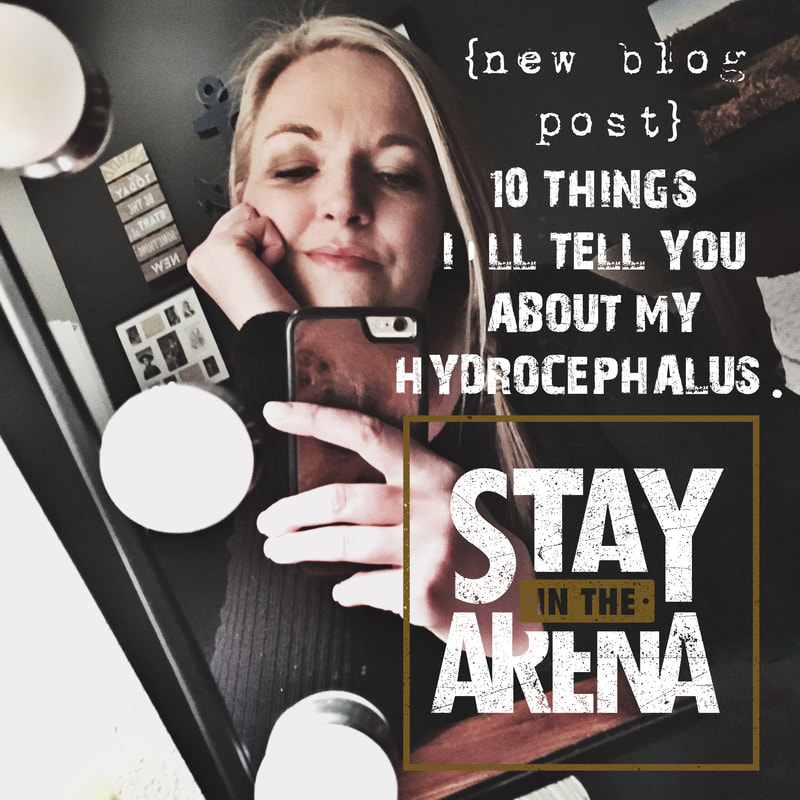 Here are 10 things I’ll tell you about my life with hydrocephalus (in no particular order). 1. It hurts. The most common questions I get via my blog or social media relate to what my headache pain is like, and how I treat it. I have a strict policy that I don’t share specifics regarding medications, etc. but I will tell you that I do have chronic daily headaches, and I manage them with a combination of medication, lifestyle, and therapy. Mental training and meditation are also a part of my daily life, and through these I control my reaction and experience with pain. 2. I believe that the trauma my brain (and body) goes through due to hydrocephalus can be healed-- if I am willing to put in the work. When I was re-shunted in 2012, I made it a personal challenge to learn as much as I could about neuroscience and the brain. I devoured everything I could learn about hydrocephalus and the treatment options that are available. I also researched the healing processes of the brain and body. I currently do strength training (weight lifting) five days a week, and work methodically towards rehabilitation after each surgery. Music therapy has helped me a lot. In addition I focus on my nutrition, hydration, and rest to assist in my healing. 3. I love my neurosurgeon. I travel 3 hours for the surgeon that I have seen for over ten years. He is in a small market (Bend, Oregon) but the drive is well worth it. The most important things to me are that I communicate well with him, he knows my case, and I know he believes in me. Even when I have a hard time healing from brain surgery, and he knows I will give 100% effort, all the time. There is nothing more crucial than having a good working relationship with the person who is making game-time decisions on your behalf. 4. My face tingles. The facial nerve that runs through my right cheek tingles intensely, is painful, and makes my eye droop sometimes when my shunt is acting up. This is not necessarily a classic symptom of hydrocephalus. But it’s a symptom that I have – a result of having the right side of my head cut open 20+ times. It’s just damaged. So… sometimes things happen that lead to other things happening. It’s just part of the deal. I try hard to take care of all those little things that come along with the overall package – because taking care of the little things makes dealing with the big things a heck of a lot easier. 5. I have trouble with balance. Yep. It’s almost comical. My balance is so bad sometimes… I have fallen in the grocery store, on construction jobsites, and in the gym – all in the past 6 months! So, I work really hard at staying safe, and knowing the environments in which my brain gets a little shaky. Personally, I have a harder time with balance when my nervous system gets overwhelmed – so I try to stay out of situations where there is a lot of confusion… big crowds milling around, or a lot of flashing lights and colors. Those are things that bother me personally – you may have totally different triggers. But just know that if you struggle to stay on your feet, you are not alone! 6. It takes about 3 weeks after brain surgery for me to start to feel like myself again, and it takes about 6 weeks for me to fully heal. I have a pretty consistent response to surgery, and I am thankful for the predictability of these patterns. I find comfort in knowing that the horrible parts won’t last forever, and I am highly motivated to push for the good days. 7. Sleep is a battle. Lying down makes my programmable shunt’s flow slow down, and I get really bad pressure headaches at night. I also have a lot of nerve pain now, which flares up at night when I lay down. I have never been able to get into a deep sleep if I’m propped up, so I just try to sleep the best I can. When I wake up in the middle of the night, I have to get up and walk around a little bit. Then I listen to a sermon from one of my favorite pastors, an Audiobook, or a sleep meditation until I fall asleep again. 8. My hair is falling out. I was blessed with really thick long blonde hair – which completely covers my incision site. But my scalp has taken a beating on the right side, and recently I have had hair falling out in big chunks, which is really alarming. I found out that this is a common trauma response, especially after a lot of anesthesia… and I had 3 surgeries in 5 months in 2018. So I’m taking all the steps to protect my hair as best possible, but also to soothe my nervous system. It’s slowly getting better! 9. Hydrocephalus affects my relationships with other people. This might seem obvious, but it’s worth saying out loud (or on paper… or in this blog post.) Sometimes hydrocephalus has had a negative effect on my relationships, but on the flip side… there are people in my life that I never may have known if it wasn’t for hydrocephalus. There are lots of things that can be said on this topic… In fact, it was one of the things I spoke about at the 2018 HA Conference – but the bottom line is that the people who are meant to be in my life will be there. Others, who are meant to be there for just a season, will come and go. Ultimately, this is my path to walk… and for those who make the choice to stand in battle with me today, I am forever thankful. 10. I am grateful for the journey. When I was diagnosed with hydrocephalus at age 17, I had no idea how much it would change my life going forward. Recently I have spent a good deal of time studying ancient stoic philosophy. Learning about the stoic mentality has given me a better understanding of how people in history have overcome enormous obstacles. I have come to accept that the exact thing that has brought me the most pain and challenge in my life has also been the thing that has brought me the most purpose and motivation. I believe that hydrocephalus has made me a stronger person, and has taught me patience, endurance, and empathy for others who are in the same boat. I have committed myself to using the journey that I am on to try to help other people, by sharing my story and supporting them in their own. For these things, and for the incredible souls that are on this life path with me, I have relentless love. Over the years, I have shared a lot of things about my life with hydrocephalus, but I still feel like there are so many people out there who are struggling with loneliness in this diagnosis. If you are one of those incredible humans… if you have hydrocephalus and feel alone, or if you have a child who has been diagnosed with hydro and you are desperately looking for information, inspiration, and comfort… I’m here to tell you that you are not alone. We may be facing a giant mountain of uncertainty, but we will climb it together. Thank you for reading my words. And thank you for walking beside me. Here’s to our relentless pursuit, Amy
10 Comments
1/7/2019 04:45:34 pm
I truly wish that people better understood this Hydrocephalus journey that we’ve been forced to travel.
Reply
Amy
1/8/2019 01:21:01 pm
Helping people understand the journey is one of the reasons I have chosen to share my life and story in this way. The other reason is to create awareness for the need for better answers and solutions. All we can do is to take each day at a time, and do our best.
Reply
Judie
1/7/2019 08:15:45 pm
I wish that people with invisable injuries such as hydrocephalus were treated better, listened too and understood, and that the issues we deal with are many and complex, and at times life threatening, and life altering.
Reply
Amy
1/8/2019 01:24:04 pm
How we are treated is out of our control... but how we respond is 100% up to us. I choose to respond by spreading as much love and awareness as possible. I hope you have a good day!
Reply
Tiffany Kelley
1/9/2019 12:12:17 pm
Truly this is extremely hard! As with this truly it’s invisible but that doesn’t mean we are not hurting. I have been in constant pain for now 3 years! It’s so hard.! I hope it lowers some day!
Reply
Amy
1/21/2019 05:58:32 am
I hope so too. Stay strong!
Reply
Kathi
2/4/2019 09:50:05 pm
Having recently gotten engaged over Christmas after being single for the last several years, I’m a bit apprehensive. I’ve never been this afraid of getting close to someone. The relationship is definitely the strongest I’ve been in. I’m not sure if my skittishness is a side effect of my hydrocephalus or what. I’m really moody and unsure at times, but my fiancé is an awesome guy. He was there every step of the way during surgery and recovery.
Reply
Amy
2/10/2019 06:47:15 am
Congratulations on your engagement, Kathi!!
Reply
Kathi
9/6/2023 08:23:52 pm
I never thought I’d be asking this question…married now just over 3 years. Organization is a definite struggle for me, as is keeping up with housework the way my husband wants (dishes and laundry all done and put away every night after work (I work a full 8 hr day M-F. 1st shift). He works 3rd and feels too overwhelmed if I ask for his help because he “has to do the man chores as well as the things I can’t do because of my disability (I can’t drive because of agenesis of the corpus callosum and epilepsy, so he has to get groceries and other errands I’m unable to.) if I have a headache or something going on, he accuses me of being lazy and says I should be able to work around my disabilities like others can. Very little compassion. In his eyes, I should be working from the time I get out of bed until the time I go to bed again between my job and housework. I’m “no good to anyone if I don’t”. If I have time to watch tv, I should be doing housework. HOW CAN I GET HIM TO UNDERSTAND (aside from a smack in his head)? I’m flabbergasted at the 180 he’s pulled on me.
Amy
9/14/2023 05:18:00 am
Kathi,
Reply
Leave a Reply. |
AuthorMy name is Amy but friends and family call me Am. I am a lover of dogs, good whiskey, and strength training. I'm a brain surgery survivor (x31), a fiddle player, a construction designer, and a boxing enthusiast. I have six real siblings, and five fake brothers. I love deeply, and consider my close friends to be family. Archives
February 2022
Categories
All
|


 RSS Feed
RSS Feed